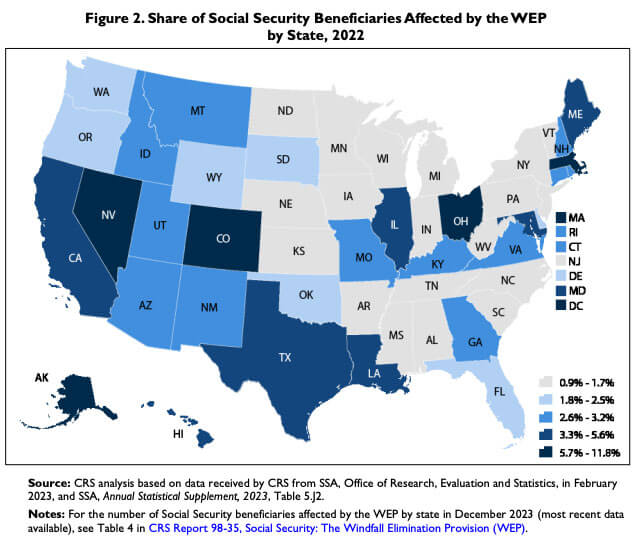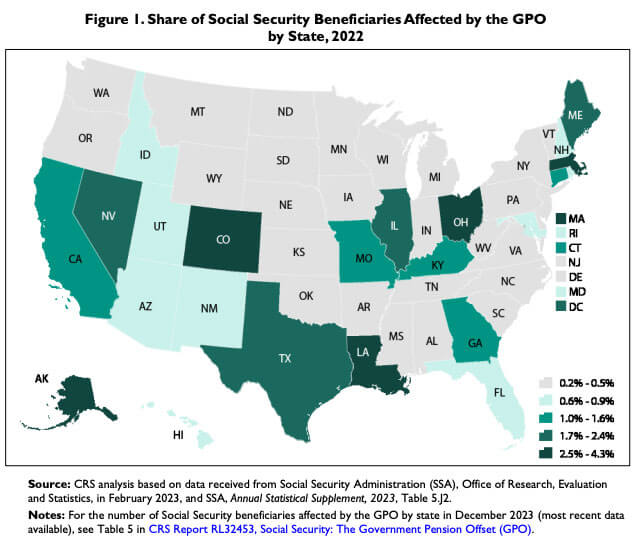 The GPO and WEP are two separate provisions that reduce regular Social Security benefits for workers and family members if they receive pensions based on earnings not covered by Social Security. Image: Shchus/Shutterstock.com
By: FEDweek Staff
The GPO and WEP are two separate provisions that reduce regular Social Security benefits for workers and family members if they receive pensions based on earnings not covered by Social Security. Image: Shchus/Shutterstock.com
By: FEDweek StaffFollowing is a new brief report from the Congressional Research Service showing the differing impacts by state of the Social Security government pension offset and windfall elimination provisions, in advance of a possible House vote as soon as November to repeal those provisions.
The Social Security Fairness Act of 2023 (H.R. 82) was introduced by Representative Garret Graves on January 9, 2023. (S. 597, a companion bill, was introduced by Senator Sherrod Brown on March 1, 2023.) The bill would repeal two provisions under Social Security—the Government Pension Offset (GPO) and the Windfall Elimination Provision (WEP)—for benefits payable after December 2023.
The GPO and WEP are two separate provisions that reduce regular Social Security benefits for workers and their eligible family members if they receive (or are entitled to) pensions based on earnings from employment not covered by Social Security and not subject to its payroll tax. The two largest groups of Social Security beneficiaries that may be (or are currently) affected by the GPO and WEP are (1) about 28% of state and local government employees covered by alternative staff retirement systems and (2) most permanent civilian federal employees hired before January 1, 1984, who are covered by the Civil Service Retirement System (CSRS) or another alternative retirement plan. On September 9, 2024, the Congressional Budget Office estimated that H.R. 82 would increase direct spending by about $196 billion over the period 2024-2034.
On September 10, 2024, Representative Graves filed a discharge petition on a special rule (H.Res. 1410) currently in the possession of the Rules Committee that would provide for consideration of H.R. 82 on the House floor. On September 19, 2024, this discharge petition obtained the necessary 218 signatures to make it privileged for consideration by the full House. The discharge effort in relation to H.R. 82 is expected in the House in November 2024.
This Insight provides summary information on the GPO and WEP, including how each provision works, who is affected, arguments for or against these provisions, and relevant legislation in the 118th Congress, including H.R. 82.
The Government Pension Offset (GPO)
The GPO reduces the Social Security spousal or widow(er)’s benefits of most people who also receive pensions based on federal, state, or local government employment not covered by Social Security. Under current law, the Social Security spousal or widow(er)’s benefit is reduced by an amount equal to two-thirds of the noncovered government pension (i.e., a 67% offset). In December 2023, 745,679 Social Security beneficiaries, or about 1% of all beneficiaries, had their benefits reduced by the GPO.
The share of Social Security beneficiaries affected by the GPO varies widely by state (see Figure 1). States with a relatively larger share of GPO-affected beneficiaries are usually those with a larger share of state and local government employees not covered by Social Security or those with more CSRS retirees.
The GPO’s defenders maintain that it helps ensure that only financially dependent spouses receive the full Social Security spousal or widow(er)’s benefit while curtailing what would otherwise be an unfair advantage for government workers who are not covered by Social Security. Opponents of the GPO argue that the GPO is not well understood and that it harms lower- and middle-wage workers, such as teachers, and in some circumstances pushes these retired workers into poverty.
H.R. 82/S. 597 would repeal the GPO for all Social Security beneficiaries after December 2023. Additional legislative proposals in the 118th Congress include, for example:
• eliminating the GPO (and the WEP) temporarily (e.g., S. 2280 and H.R. 4583), and
• eliminating the GPO for some beneficiaries (e.g., H.R. 8487 and H.R. 8835).
The Windfall Elimination Provision (WEP)
The WEP is a modified benefit formula that reduces the Social Security benefits of certain retired or disabled workers who are also entitled to pension benefits based on earnings from jobs that were not covered by Social Security. In December 2023, about 2.1 million people (or about 3% of all Social Security beneficiaries) were affected by the WEP.
Similar to the GPO, the share of Social Security beneficiaries affected by the WEP varies by state. Typically, states that have a larger share of state and local government employees not covered by Social Security or more CSRS retirees have a relatively larger share of Social Security beneficiaries affected by the WEP (see Figure 2).
Proponents of the measure say that it is a reasonable means to prevent payment of overgenerous and unintended benefits to certain workers who would otherwise profit from the Social Security regular benefit formula. Furthermore, they maintain that the provision rarely causes hardship because, by definition, the people affected also receive pensions from noncovered work. Some opponents of the WEP believe the provision is unfair because it substantially reduces a benefit that certain workers may have included in their financial planning for retirement. Other critics note that the current-law windfall elimination formula is an imprecise way to determine the actual windfall when applied to individual cases.
H.R. 82/S. 597 would repeal the WEP for all Social Security beneficiaries after December 2023. Additional legislative proposals in the 118th Congress include, for example:
• revising the WEP formula (e.g., H.R. 4260 and H.R. 5342), and
• eliminating the WEP (and the GPO) temporarily (e.g., S. 2280 and H.R. 4583).
5 Steps to Protect Your Federal Job During the Shutdown
Over 30K TSP Accounts Have Crossed the Million Mark in 2025
The Best Ages for Federal Employees to Retire
Best States to Retire for Federal Retirees: 2025
Primer: Early out, buyout, reduction in force (RIF)
See also,
OPM Guidance Addresses Pay Issues arising During, After Shutdown



